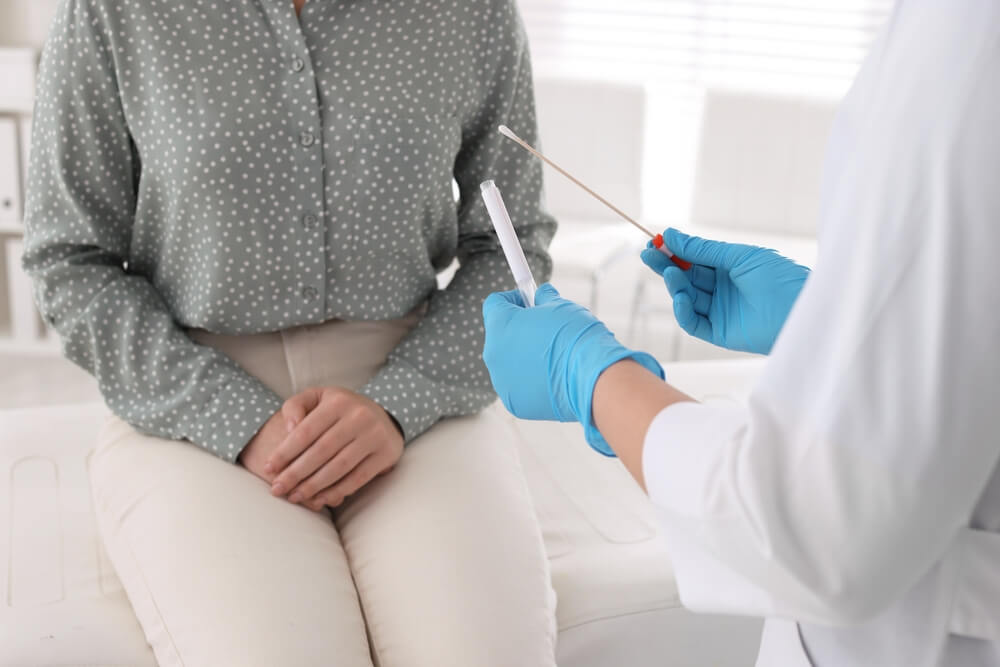Genital herpes is a prevalent sexually transmitted disease caused by herpes simplex viruses. Despite its prevalence, many individuals with herpes exhibit no visible signs of infection, meaning that in some cases, there are no first signs of herpes. This makes it that more crucial to understand this condition better.
This article explores genital herpes in women, focusing on its symptoms, transmission, diagnosis, treatment, prevention, and its impact on relationships and pregnancy. If you have any further questions after finishing this article, feel free to reach out to our experts in the medical fields of obstetrics and gynecology in South Miami, Florida.
Understanding The Disease: Genital Herpes Causes

Genital herpes is primarily caused by two herpes simplex viruses, with one responsible for most genital herpes cases and the other more commonly associated with cold sores or fever blisters. According to the U.S. Centers for Disease Control and Prevention (CDC), approximately one out of six people aged 14 to 49 in the United States have genital herpes. Notably, women are more susceptible to herpes infection than men.
Transmission of Genital Herpes
The herpes virus spreads through direct skin-to-skin contact with an infected individual. This transmission commonly occurs through:
- Herpes Sores or Blisters: Most frequently, herpes spreads when there are visible sores or blisters on an infected person’s skin.
- Normal-Looking Skin: Surprisingly, herpes can also spread from areas of the skin that appear normal, even in the absence of visible sores.
- Sexual Contact: Herpes can be transmitted during vaginal, anal, or oral sexual contact, as well as through simple skin-to-skin contact, even without visible sores.
- Vulnerable Skin: The virus can enter the body through the lining of the mouth, labia, vagina, or regular skin with small cracks or cuts.
It is essential to note that individuals with compromised immune systems, often due to diseases such as cancer or HIV/AIDS, are more susceptible to herpes infections.
Asymptomatic Transmission
As mentioned above, there are no first signs of herpes, and this leads to one concerning aspect of genital herpes. Infected individuals who are unaware of their condition can still transmit the virus to others. This makes regular testing and open communication about sexual health crucial in preventing the spread of the virus.
Herpes Outbreak Symptoms
Genital herpes often presents differently in women, with some remaining asymptomatic or exhibiting only mild symptoms. Key symptoms to watch for include:
First Outbreak – Signs of Herpes in Women:
- Tingling, burning, or itching sensation anal area and around the vagina.
- Symptoms that resemble the flu, such as swollen glands and even fever.
- Vaginal, buttock, and leg pain.
- Altered discharge from the vagina
- Difficulties peeing
- Headaches
- Abdominal pressure
Signs of Herpes in Women – After The First Outbreak
After a few days, painful sores or blisters may develop in areas where the virus entered the body, such as the vaginal or anal area, mouth, inside the vagina, cervix, urinary tract, buttocks, thighs, or other parts of the body where the virus is active. Sometimes, the initial outbreak may not occur until months or even years after infection.
Subsequent outbreaks tend to be less severe and shorter in duration than the first outbreak, although individuals with weakened immune systems may experience more severe and prolonged episodes.
Diagnosing Genital Herpes
The only definitive way to diagnose genital herpes is through a medical examination and laboratory testing conducted by a healthcare provider. They may take samples from a sore, blister, or blood to confirm the presence of the virus. It’s essential to inform your current and recent sexual partners about your herpes infection to prevent further transmission.
Genital Herpes Treatment
While genital herpes cannot be cured, antiviral medications are available to manage outbreaks effectively. These medications can:
- Shorten the duration of outbreaks.
- Reduce the severity of symptoms.
- Decrease the frequency of outbreaks.
Most individuals with herpes can live with the virus and effectively manage their symptoms. Open and honest communication with healthcare providers is crucial, as they can prescribe appropriate medications and offer guidance on reducing the risk of transmitting the virus to sexual partners.
Preventing Genital Herpes
Preventing genital herpes primarily involves safe sexual practices:
- Avoid Skin-to-Skin and Sexual Contact: The most effective way to prevent herpes transmission is to avoid skin-to-skin and sexual contact with infected individuals, especially during outbreaks.
- Practice Safe Sex: Using latex or polyurethane condoms and dental dams correctly can significantly reduce the risk of getting genital herpes. Condoms should be used before vaginal, anal, or oral sex.
- Limit Sexual Partners: Reducing the number of sexual partners can lower the risk of exposure to the virus.
- Inform and Get Tested: Open communication about sexual health is crucial. Individuals should inform their partners about their herpes status, and both partners should get tested for sexually transmitted diseases before engaging in sexual activity.
- Use Antiviral Medication: For those with recurrent outbreaks, daily antiviral medication can lower the risk of spreading the virus to sexual partners.
Impact on Pregnancy
Pregnant women with genital herpes can transmit the virus to their newborns during childbirth. This can lead to complications such as premature birth, skin, eye, or brain problems, and, in severe cases, infant mortality. It is essential for pregnant women to inform their healthcare providers about their herpes status and to seek medical guidance on managing the condition during pregnancy.
Additionally, healthcare providers may recommend antiviral medication for pregnant women with genital herpes to reduce the risk of viral shedding during childbirth. This proactive approach can significantly lower the chances of virus transmission to the newborn. Expectant mothers must work closely with their medical team to ensure a safe and healthy pregnancy, minimizing potential risks associated with genital herpes.
Open Communication Is Pivotal

Women should never feel ashamed or hesitant to discuss genital herpes with their healthcare providers. Open and honest communication with medical professionals is crucial for managing the condition effectively. Healthcare providers are trained to handle such discussions with empathy and professionalism, ensuring that women receive appropriate guidance, support, and medical care.
Discussing genital herpes allows providers to offer valuable information about treatment options, prevention strategies, and how to manage the condition during pregnancy, if applicable. Remember, genital herpes is a common infection, and healthcare providers are here to help and support individuals in every aspect of their health, including managing and coping with herpes. Your provider is a trusted partner in your healthcare journey, so don’t hesitate to have these important conversations to ensure your well-being.
Learn More
Genital herpes is a common sexually transmitted infection that affects women differently. Understanding the signs and symptoms, modes of transmission, prevention measures, and available treatments is essential for managing the virus effectively. Open communication with healthcare providers, regular testing, and safe sexual practices are key components in reducing the spread of genital herpes and its impact on women’s health and relationships.
That said, you can always schedule an appointment with our experts, who are ready to address all of your concerns and questions.


